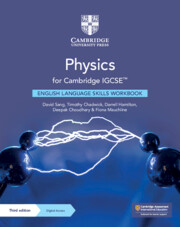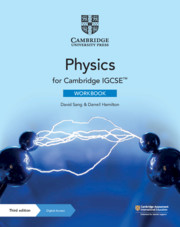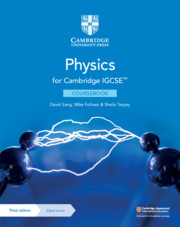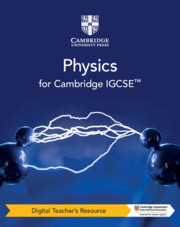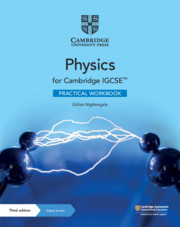Our research shows that English language skills are the single biggest challenge to students accessing international science. Language should never be a barrier to a student’s learning journey. Science can be a particular challenge because of specific technical vocabulary and sentence structures. This English language skills workbook with digital access helps learners to develop their language skills in the context of the Cambridge IGCSE™ Physics syllabus. The workbook contains exercises for each chapter that combine the science content with relevant language skills. Exercises develop learners’ language enabling learners to practise using key vocabulary in different ways, such as through the provision of sentence stems for students to use in their own writing; through speaking and listening with peers, or group work. Activities range from practising using comparative adjectives in the context of measuring density, to writing a set of instructions using the imperative for an experiment investigating frequency and pitch. Answers for all questions and exercises can be found online at www.cambridge.org/go
Features
- Wide-ranging exercises and activities reinforce syllabus content whilst providing structured support to develop relevant language skills
- ‘Language Tips’, such as, providing extra information to aid memory of key terms, or suggestions of synonyms or alternative ways of expressing ideas help learners to build linguistic confidence
- A glossary of the words and definitions from the ‘Key Words’ feature boxes in context throughout each chapter is found at the back of the book as a quick reference tool
- Scientific vocabulary, academic vocabulary and everyday vocabulary that might be challenging (e.g. work, table) is highlighted and defined in ‘Key Terms’ boxes in context throughout the workbook as a quick, reassuring reference point
- ‘Language Focus’ feature provides a background linguistic explanation of the relevant skills in context throughout the text, giving you confidence you are using the right skills.
Table of Contents
- How to use this series
- How to use this book
- Introduction
- 1. Making measurements
- 2. Describing motion
- 3. Forces and motion
- 4. Turning effects
- 5. Forces and matter
- 6. Energy changes and transfers
- 7. Energy resources
- 8. Work and power
- 9. The kinetic model of matter
- 10. Thermal properties of matter
- 11. Thermal energy transfers
- 12. Sound
- 13. Light
- 14. Properties of waves
- 15. The electromagnetic spectrum
- 16. Magnetism
- 17. Static electricity
- 18. Electrical quantities
- 19. Electrical circuits
- 20. Electromagnetic forces
- 21. Electromagnetic induction
- 22. The nuclear atom
- 23. Radioactivity
- 24. Earth and the Solar System
- 25. Stars and the Universe
Brighter Thinking Blog
Keep up to date with the latest classroom tips and educational trends from our brighter thinkers.
Visit the blogCatalogues and Ordering
Looking for something in particular or just browsing? View our catalogues to see our full range of print and digital books.
View and downloadAdvice on useful tools
Advice on useful tools, activities and timetabling from teachers experiencing school closures.
Cambridge GO
All our supporting resources have now moved to Cambridge GO – the new home for your Cambridge digital content.
Listen to our podcast
Listen to our podcast to discover teaching inspiration & advice from leading educational thinkers.

